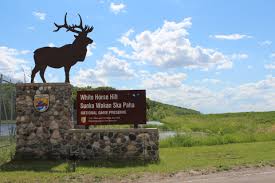
- Details
- By Native News Online Staff
In a landmark decision reaffirming its commitment to Tribal self-governance, the United States government has returned 680 acres of hay ground to the Spirit Lake Nation. This long-awaited victory follows a determined 65-year effort by the tribe to reclaim lands deemed “submarginal” and previously designated as excess to the needs of the White Horse Hill National Game Preserve.
Originally part of the Spirit Lake Nation’s reserved territory, these lands were set aside in 1904 by President Theodore Roosevelt for Bureau of Indian Affairs (BIA) Agency Reserve purposes, primarily for education and government services. In the late 1950s, the tribe formally petitioned for their return as part of a broader congressional movement to restore submarginal lands to Indigenous nations. However, the U.S. Fish and Wildlife Service (USFWS) retained the property, using it to produce hay for the buffalo population at White Horse Hill.
In recent years, the USFWS ceased utilizing the land, rendering it surplus to its needs. This prompted the General Services Administration (GSA) to approve its return, marking a significant milestone in U.S.-tribal relations. The decision underscores a renewed focus on honoring treaties, strengthening government-to-government relations, and upholding commitments to Indigenous communities.
"This return of land is a significant step towards healing and reconciliation. After decades of effort, we are grateful for the support of our partners in the government and the recognition of our rightful claim to these lands," Chairperson Lonna Jackson-Street commented, "We also extend our gratitude to the previous administration under the leadership for former Chairman, Douglas Yankton, and their efforts in laying the foundation to reclaim these lands. This is not just about regaining land; it is about celebrating our history, culture, and the future of our tribe's legacy."
The Spirit Lake Nation is eager to embrace the opportunities this land offers for the community, with a steadfast commitment to sustainable stewardship and honoring the legacy of their ancestors.
More Stories Like This
Committee Advances 20% Increase to Navajo Child Support GuidelinesNavajo Committee Advances $84M Transportation Improvement Plan
NCAI Passes Two Emergency Resolutions on Immigration Enforcement Activities
Chickasaw Lighthorse Police Officer named Indian Country Law Enforcement Officer of the Year
Indian Gaming Association Rallies Broad Coalition Against Sports Event Contracts It Calls Illegal Threat to Tribal Sovereignty
Help us defend tribal sovereignty.
At Native News Online, our mission is rooted in telling the stories that strengthen sovereignty and uplift Indigenous voices — not just at year’s end, but every single day.
Because of your generosity last year, we were able to keep our reporters on the ground in tribal communities, at national gatherings and in the halls of Congress — covering the issues that matter most to Indian Country: sovereignty, culture, education, health and economic opportunity.
That support sustained us through a tough year in 2025. Now, as we look to the year ahead, we need your help right now to ensure warrior journalism remains strong — reporting that defends tribal sovereignty, amplifies Native truth, and holds power accountable.
 The stakes couldn't be higher. Your support keeps Native voices heard, Native stories told and Native sovereignty defended.
The stakes couldn't be higher. Your support keeps Native voices heard, Native stories told and Native sovereignty defended.
Stand with Warrior Journalism today.
Levi Rickert (Potawatomi), Editor & Publisher


